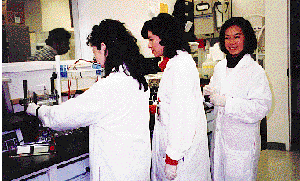GOLDSEA | ASIAMS.NET | ASIAN AMERICAN PERSONALITIES
DR DNA
PAGE 3 of 7
"You cannot do anything to increase the number of replications," Fong says. "And so far there has been no success in corrective mutation." Meaning no one has yet succeeded in turning genes off or on to produce beneficial changes in humans. But hormones and many other kinds of molecules can switch genes on and off, he notes, holding out real hope that life-extending genetic engineering techniques can be developed in the not-too-distant future--with the help of tools developed by Clontech.
| "Chemistry gave you such a large variety of colors and I was highly attracted to them." |
Soon after the birth of Kenneth's younger brother Danny in 1951, his father Tong Fong, then 35, immigrated alone to the U.S. as had his own grandfather at the turn of the century
"[My paternal great grandfather] made quite a bit of money in Fresno by selling bean sprouts," Fong says. "He went back to China and built two or three houses there. In their time the Chinese immigrants found it more enjoyable to earn money and disappear back to their native land."
Kenneth's father wasn't so successful. Tong Fong found work as a cook in a San Francisco Chinese restaurant. "He was not a fancy kind of chef," Fong says. "He had so little education, only about five years of schooling. He was a laborer all his life."
For 15 years Tong Fong lived alone and sent money to his family back in Hong Kong. This provided Kenneth with a childhood neither marred by privation nor blessed with luxury. "I never saw myself as a rich kid or a poor kid," Ken Fong says. "Every basic thing I wanted, I had."
Though he was the elder son, Kenneth felt no compulsion to try to fill his father's shoes. "There was not a whole lot of need to protect my family because my mother is pretty strong," he recalls. She earned extra money by taking in piecework from sewing factories. Even to this day the memory of his mother's struggle without a formal education fills her son with a sense of guilt. The guilt doesn't come from any sense of personal responsibility but seems part of a generalized guilt about human privation.
"I feel guilty when I see homeless people," Fong says by way of example. "I always give them some money."
Fong can recall no personal experiences that might account for this free-floating guilt.
"Maybe it's a little bit genetic," he says. "It's probably a combination of different kinds of feelings. My mother would say, 'If I would have had a little more education, I would be able to read the bible.' I just felt terrible."

As a result of his early separation from his father, Kenneth and his brother grew up feeling much closer to their mother.
In the 10th grade at New Method College--actually a private high school --Fong took his first chemistry class and developed affection for the subject.
"Chemistry gave you such a large variety of colors and I was highly attracted to them," Fong recalls. "I asked myself, Why are chemicals so different in color? Can we make something that changes from one color to another and reverse it back to the original color?" Consumed by these questions, on his own he wrote a paper on the subject and sent it to a student journal. To the delight of the 15-year-old budding scientist, it was published. What's more, the effort earned him a HK$10 honorarium.
"I was so elated that they acknowledged what I had written and secondly they had given me 10 dollars!" From then Fong was excited by the thrill of producing useful things from the effort of his mind.
He did well in subjects he liked--chemistry and biology, for example--but not as well in other subjects like mathematics.
"I can grasp the basic math," he says, "but I have a little problem learning higher order mathematics. Differential equations I had a little problem with."
Still Kenneth showed enough academic aptitude to become the most highly educated of his siblings. Sister May is a homemaker in Vancouver. His younger brother is a chemist who founded a Palo Alto-based company called Scientific Environmental Laboratories in his 30s.
After high school Kenneth enrolled in a two-year teacher's college, the option that best suited the family's finances. The Hong Kong government was financing the program in an effort to increase the supply of teachers. PAGE 4
Page 1 |
2 |
3 |
4 |
5 |
6 |
7 |
CONTACT US
|
ADVERTISING INFO
© 1996-2013 Asian Media Group Inc
No part of the contents of this site may be reproduced without prior written permission.
